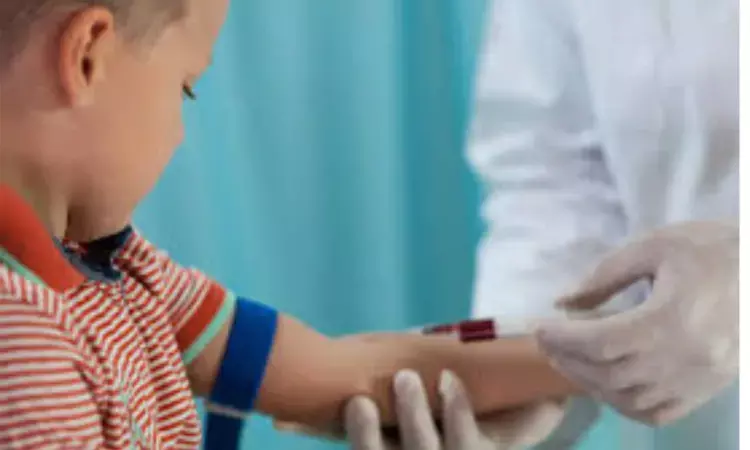- Home
- Medical news & Guidelines
- Anesthesiology
- Cardiology and CTVS
- Critical Care
- Dentistry
- Dermatology
- Diabetes and Endocrinology
- ENT
- Gastroenterology
- Medicine
- Nephrology
- Neurology
- Obstretics-Gynaecology
- Oncology
- Ophthalmology
- Orthopaedics
- Pediatrics-Neonatology
- Psychiatry
- Pulmonology
- Radiology
- Surgery
- Urology
- Laboratory Medicine
- Diet
- Nursing
- Paramedical
- Physiotherapy
- Health news
- Fact Check
- Bone Health Fact Check
- Brain Health Fact Check
- Cancer Related Fact Check
- Child Care Fact Check
- Dental and oral health fact check
- Diabetes and metabolic health fact check
- Diet and Nutrition Fact Check
- Eye and ENT Care Fact Check
- Fitness fact check
- Gut health fact check
- Heart health fact check
- Kidney health fact check
- Medical education fact check
- Men's health fact check
- Respiratory fact check
- Skin and hair care fact check
- Vaccine and Immunization fact check
- Women's health fact check
- AYUSH
- State News
- Andaman and Nicobar Islands
- Andhra Pradesh
- Arunachal Pradesh
- Assam
- Bihar
- Chandigarh
- Chattisgarh
- Dadra and Nagar Haveli
- Daman and Diu
- Delhi
- Goa
- Gujarat
- Haryana
- Himachal Pradesh
- Jammu & Kashmir
- Jharkhand
- Karnataka
- Kerala
- Ladakh
- Lakshadweep
- Madhya Pradesh
- Maharashtra
- Manipur
- Meghalaya
- Mizoram
- Nagaland
- Odisha
- Puducherry
- Punjab
- Rajasthan
- Sikkim
- Tamil Nadu
- Telangana
- Tripura
- Uttar Pradesh
- Uttrakhand
- West Bengal
- Medical Education
- Industry
Alirocumab an efficacious lipid-lowering therapy for children with heterozygous familial hypercholesterolemia: JAMA

USA: A randomized clinical trial of 153 patients revealed that alirocumab may be an effective adjunct lipid-lowering therapy (LLT) for pediatric patients with heterozygous familial hypercholesterolemia (HeFH) inadequately controlled with statins.
"In the study, alirocumab treatment showed statistically significant reductions in low-density lipoprotein cholesterol (LDL-C) vs placebo in 2 dosing cohorts," the researchers reported in the study published in JAMA Pediatrics.
Heterozygous familial hypercholesterolemia, an autosomal dominant disorder, affects about 1 in 313 individuals characterized by severely elevated LDL-C) concentrations. If left untreated, patients may develop early-onset atherosclerotic cardiovascular disease (ASCVD). Detection and intervention to control LDL-C in children can prevent atherosclerosis progression and premature cardiovascular (CV) events in adulthood.
Many pediatric patients with HeFH cannot achieve LDL-C targets despite high-dose statins or multiagent LLTs and require adjunct lipid-lowering therapy. Recent therapeutic developments include inhibitors of proprotein convertase subtilisin kexin type 9 (PCSK9), a protease that promotes degradation of the low-density lipoprotein receptor that leads to clearing excess LDL-C from the blood.
Alirocumab is a fully human monoclonal antibody that binds and inhibits circulating PCSK9, however, alirocumab use in pediatric patients requires evaluation. Raul D. Santos, University of Sao Paulo Medical School Hospital, Sao Paulo, Brazil, and colleagues aimed to assess the efficacy of alirocumab in pediatric patients with inadequately controlled HeFH.
For this purpose, they conducted a phase 3, randomized clinical trial between 2018 and 2022 at 43 centers in 24 countries. It included pediatric patients aged 8 to 17 years with HeFH, LDL-C 130 mg/dL or greater, and receiving statins or other LLTs.
Following consecutive enrollment into dosing cohorts, 25 of 99 patients screened for dosing every two weeks (Q2W) failed screening; 25 of 104 patients screened for dosing every four weeks (Q4W) failed screening. The double-blind period was completed by 70 of 74 Q2W patients (95%) and 75 of 79 Q4W patients (95%).
Patients were randomized in the ratio of 2:1 to subcutaneous alirocumab or placebo and Q2W or Q4W. Dosage was based on weight (40 mg for Q2W or 150 mg for Q4W if <50 kg; 75 mg for Q2W or 300 mg for Q4W if ≥50 kg) and adjusted at week 12 if LDL-C was 110 mg/dL or greater at week 8. Following the 24-week double-blind period, patients could receive alirocumab in an 80-week open-label period.
The study's primary endpoint was the per cent change from baseline in LDL-C to week 24 in each cohort.
The study led to the following findings:
- Among 153 patients randomized to receive alirocumab or placebo (mean age, 12.9 years; 56.9% female), alirocumab showed statistically significant reductions in LDL-C versus placebo in both cohorts at week 24.
- The least squares mean difference in percentage change from baseline was −43.3% Q2W and −33.8% Q4W.
- Hierarchical analysis of secondary efficacy endpoints demonstrated significant improvements in other lipid parameters at weeks 12 and 24 with alirocumab.
- Two patients receiving alirocumab Q4W experienced adverse events leading to discontinuation.
- No significant difference in adverse event incidence was observed between treatment groups.
- Open-label period findings were consistent with the double-blind period.
"In pediatric patients with HeFH inadequately controlled with statins, two dosing regimens of alirocumab significantly reduced LDL-C, with continued efficacy over 2 years of treatment," the researchers wrote. "Both regimens were generally well tolerated and consistent with previous studies in pediatric and adult patients with HeFH."
"The findings indicate that alirocumab presents a suitable adjunct option to stable LLT in pediatric patients as young as 8 years old with HeFH," they concluded.
Reference:
Santos RD, Wiegman A, Caprio S, et al. Alirocumab in Pediatric Patients With Heterozygous Familial Hypercholesterolemia: A Randomized Clinical Trial. JAMA Pediatr. Published online February 05, 2024. doi:10.1001/jamapediatrics.2023.6477
Dr Kamal Kant Kohli-MBBS, DTCD- a chest specialist with more than 30 years of practice and a flair for writing clinical articles, Dr Kamal Kant Kohli joined Medical Dialogues as a Chief Editor of Medical News. Besides writing articles, as an editor, he proofreads and verifies all the medical content published on Medical Dialogues including those coming from journals, studies,medical conferences,guidelines etc. Email: drkohli@medicaldialogues.in. Contact no. 011-43720751


